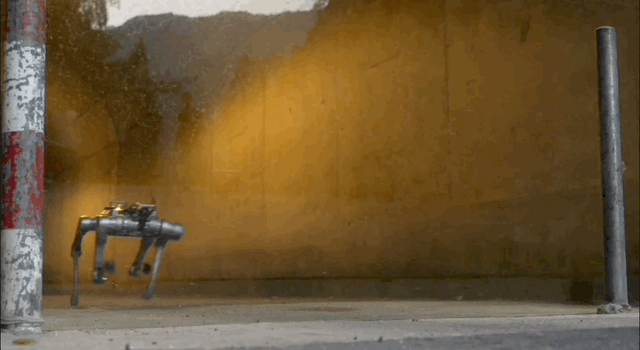
As a business founder in the tech space I am spending increasing amounts of time thinking about AI and its impact. Is Artificial Intelligence (AI) as the beginning of the end of humanity? Or is it our savior?
The truth almost certainly lies somewhere in the middle, but that said, I believe there are very clear reasons why businesses really should be worried about AI.
Founder of Container Solutions.
Amara’s Law
Amara’s Law states that the impact of technologies is overestimated in the short term but underestimated in the long term. Driverless cars, which have been coming out next year every year since 2016, is an example of overestimation.
Artificial neural networks, the key technology behind almost all AI systems you’ve heard of, might be good at playing Breakout and even predicting how proteins fold, but it cannot (yet) cope with the chaos of roads that, in my home village of Greenwich, were laid down by feet and hooves hundreds of years ago.
Amara’s Law works because researchers and practitioners, some driven by greed, others by fortune and others still by curiosity, but all of them nonetheless driven, find ways to improve the technology, find uses for it and eventually batter it into shape.
For business this is a worry for two reasons. On the one hand, if managers overestimate the readiness of a technology, then they tend to allocate too many resources to implementing it immediately at scale. Such quick ramp-ups are always followed by embarrassing climb downs.
On the other hand, if a technology is underestimated, like many did with the cloud and are doing right now with Artificial Intelligence, then all of a sudden they will find themselves playing catch up to their competitors.
A general-purpose technology’s destiny lies in users’ hands
The second reason to worry is that general purpose systems, like the content of Pandora’s box, cannot be put back once let out. For example, in the hands of Tim Berners-Lee, the personal computer and the Internet became the web. In the hands of a failed physicist in a garage in Seattle, the web gave birth to Amazon.com. What will artificial neural networks become in the hands of a hacker?
The box has been opened and we cannot put back the knowledge, the discoveries or the opportunities, good and bad, that opening the box created.
The end of the world of work as we know it
The third reason is the dramatic and continued effects on the labor market. Way before 2025 raised its head, McKinsey and the Institute for Public Policy Research (IPCC) were worrying about job losses and what the latter called the upcoming ‘job apocalypse’.
As I see it the job apocalypse seems to be coming to pass. Announcements are made daily about governments opening up their data to private firms to train their artificial neural networks and of companies shedding their workforces and replacing them with AI ‘agents’. We all know talented people who have never previously been out of a job but now can’t find one.
Businesses have a triple challenge: rearranging their teams to work alongside AI agents, reassuring those left in the workforce, even though realistically there is nothing reassuring about what is happening, and doing so whilst the Damoclean Sword of Artificial Intelligence is suspended not by a horse’s hair but by something much less tenuous: the whims of a man in an office looking at a spreadsheet.
Reaping what we all sowed
The fourth reason is probably the worst of all.
In the early part of the 2010s, Cambridge Analytica illegally collected the personal data of millions of Facebook users. From that data, psychographics, a portmanteau of psychology and demographics, were used to place targeted political advertisements into the social media streams of millions of people.
These political messages nudged enough people to vote for Donald Trump in the US presidential election of 2016. For their role in the Cambridge Analytica scandals, Facebook was fined $5 billion by the Federal Trade commission. By the time that happened, Donald Trump had already won the election.
Since 2016, sustained upheaval in the labor market continues to cause a remarkable amount of misery. In the UK, the latest reports state that 5.2 million children live in poverty. That’s 1 in every 3 children. In the United States, in 2023, the child poverty rate increased to 13.7 per cent.
Class tensions have always preceded the rise of populist, strong-men leaders. In 2016, when good old fashion propaganda collided with good old fashioned data theft, web technologies graduated from tools of commerce to… the ultimate tool of propaganda on planet Earth.
Artificial Intelligence, including the creation of deep fakes, is coming of age at the exact same moment when content moderation teams are being dismantled and strong man politics is on the rise. This new, unfettered age of disinformation has collided with people that are so desperately poor and devoid of hope that they will vote for anyone who promises to take down the elites who made them suffer so much. Politicians of all stripes sowed the wind. We all now have to reap the whirlwind.
Business leaders might not think they have the luxury of thinking about politics, yet if they work in technology they are simultaneously part of the problem and potentially the solution. Ignorance is no defense!
Conclusion
Artificial Intelligence is a tidal wave that is currently breaking, and breaking things, all around us. Because it’s already here, commentary on AI is a peculiar, often confusing and an almost always out of date, mixture of description and prediction.
There’s some consensus on the past but not much consensus on the future. AI is likely to become cheaper and easier to wield and exactly where it takes us will depend on the politics and ethics (or lack thereof) of the user.
And Amara’s Law tells us that AI is about to get really practical any moment. Welcome to the future.
We’ve featured the best business plan software.
This article was produced as part of TechRadarPro’s Expert Insights channel where we feature the best and brightest minds in the technology industry today. The views expressed here are those of the author and are not necessarily those of TechRadarPro or Future plc. If you are interested in contributing find out more here: https://www.techradar.com/news/submit-your-story-to-techradar-pro






